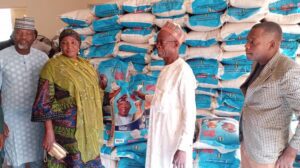Stakeholders seek equal access to healthcare as Nigeria marks World AIDS Day
As the world marks this year’s AIDS Day, stakeholders have called for equal access to HIV services.
They also advocated special attention to youths in the execution of policies toward ending the scourge.
The stakeholders spoke on Wednesday in Abuja at a ceremony to commemorate the 2022 Wold AIDS Day (WAD).
The ceremony was organised by AIDS HealthCare Foundation (AHF), in collaboration with other stakeholders including UNAIDS, NACA and UNICEF.
Others included Association of Positive Youths (APYIN), Positive Access for Treatment Access (PATA), and Association of Women Living with HIV/AIDS in Nigeria.
The 2022 WAD has the theme: `Equalise to end AIDS’.
The day is celebrated on Dec.1 and seeks to address inequalities which are holding back progress toward ending AIDS.
Dr Echey Ijezie, Country Programme Director, AHF Nigeria, said the global theme, “Equalise to end AIDS”, was to ensure equal access of treatment and prevention to everyone.
“We at AHF are lending our voice by saying it is not over; we want to ensure there is equal access to treatment, inequalities are eradicated, and whatever barriers that are there are removed.
“We want everyone to access treatment services; we are also reminding the general public that HIV is still with us.
“A lot of success has been made and we want to thank all relevant stakeholders for their roles toward ensuring a significant downwards trend especially in Nigeria,’’ he said.
Ijezie, however, called on the government and all stakeholders to intensify efforts toward ending AIDS.
Dr Victoria Isiramen, Health Manager, Adolescents, Health and HIV programming at UNICEF Nigeria, called for special attention to adolescents and young people in the HIV response in Nigeria.
Isiramen said it was important to prioritise the response to address key issues that affect the 10-24 years group.
“We have about 70 million of this group of people in Nigeria; that is a huge population with peculiar character.
“They are young, they are growing, they are in their behavioural stimulation stage and they need to develop in a proper way, they need to be skilled and empowered.
“This is their formative years, so if we want a generation and a future that is secured, we need to invest in young people.”
She further said that Nigeria had a strategic plan to ensure zero new infections, zero stigma and discrimination, especially in young girls.
“This is because our data is showing that of the 7,600 new infections that happen in young people in 2021, many of them are girls.
“So, if we invest more in a girl, we secure her future, we secure her future partner and the life of the child she will give birth to.
“This is a call to Nigeria as a country; we have gone a long way in HIV response, we have good plans, now we need to implement with our monies, energy and commitment,” she said.
Also speaking, Dr Takpa Koubaguine, Strategic Information Administration, UNAIDS, said that “equalise to end AIDS”, the theme of the event, was to give chance to everybody to access their health right, HIV prevention and access to treatment.
“Equalise’ also means identifying different barriers to access all programmes and services such as environmental barriers, legal barriers and programme barriers.
“Today, we have all the tools; we have all the technology and science has proven that the treatment of HIV is effective to suppress the virus, so there is no need to have new infections,’’ he added.
Dr Daniel Ndukwe, Deputy Director, Prevention and Social Behaviour Change Communicator, NACA said the agency was currently reviewing the National Strategic Plan for the country.
Ndukwe said the new plan was better, with more informed response than the previous one, adding that the plan had a gender dimension to HIV.
He stressed that women were more vulnerable to HIV due to their biological make up as well as socio and cultural factors.
“Women are less empowered, they are also less empowered to negotiate safe sex, some women might need the permission of the man to go to health facilities.
“Also, the woman may have a man that is infected with HIV and may hide it,’’ he said.
He, however, said that the national response had a human right angle that was mainstreamed into all activities which would help identify structural barriers across all parts of the country.
The event featured dances, quiz presentations and a dialogue among youths from across the FCT and environs.




